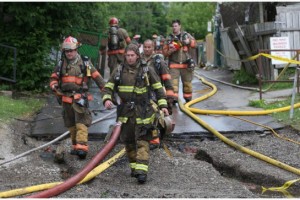By: R. Michael Warren - Toronto Star
Wage increases of police, firefighters and paramedics are outstripping cost of living, rate of inflation and average of other public sector workers.
Ontario municipalities are struggling with the escalating cost of essential emergency services — police, firefighters and paramedics. They are a prime driver of the debilitating cycle of higher property taxes, followed by service cuts, followed by higher taxes.
Emergency services swallow up half the budgets of many smaller municipalities. Eighty-four per cent of Toronto’s operating budget increases for the last 10 years have been driven by salary increases for essential services.
In 2011, Ontarians spent $320 per person on policing alone. That’s 18 per cent higher than B.C., 11 per cent higher than Alberta and 8 per cent more than Quebec. There’s no convincing rationale for our higher policing costs.
The recent OPP wage increase of 13.6 per cent over four years, with an 8.55 per cent catch-up hike this year, creates a new police compensation Mount Everest. It has set off yet another round of municipal police forces demanding comparable increases.
Over 15 years to 2011, the wage increases of police, firefighters and paramedics have far outstripped the cost of living, the rate of inflation and the average of other public sector workers, including nurses and teachers.
They also enjoy expensive pensions and fringe benefits: coverage that most ratepayers will never enjoy. The questionable “retention bonuses” paid to keep essential workers in cities where they are already working are yet another cost.
Every year, 1,500 municipal leaders meet at the Association of Municipalities of Ontario conference. And every year they beg the province to help them contain the runaway compensation of first responders.
Russ Powers, president of AMO said, “When it comes to wage and benefit increases, police and fire are in a class of their own . . . and it is not sustainable.” He pointed to arbitration awards saying it’s time to “restore confidence” in the arbitration system.
Part of the solution rests with the municipalities. They have to do a better job of determining what’s really needed from emergency services and then restructure them for more cost-efficient delivery.
But that process will take years. Meanwhile, there’s an initiative the province can take that is long overdue: reform the essential emergency workers arbitration systems.
Essential workers do not have the right to strike. Interest arbitration is the only mechanism available to resolve their collective bargaining disputes.
But for decades provincial governments have failed to require arbitrators to consider key criteria in the legislation: the ability of a municipality to pay, the impact of an award on local services and taxes, and workplace comparisons with other local employees in the public and private sectors.
Instead, they’ve been allowed to base their awards largely on comparisons with other essential workers across the province. This encourages first responders in Owen Sound to demand the same compensation as their counterparts in Toronto.
Unless municipalities capitulate during negotiations, essential worker unions force outstanding issues to arbitration in pursuit of rich awards. There is no appeal. Cities are left to cope with the financial fallout.
As a result, wages and benefits have been driven to indefensible heights. And it’s created an unfair two-tier public service: those who enjoy the benefits of this arbitration system and those who don’t.
It’s also prompted the Drummond Commission, the AMO, police boards and the Ontario Chamber of Commerce to examine the current system and call for a similar set of reforms:
1. Streamline the process and limit arbitrators to one year to render a decision.
2. Give arbitrators clear, measurable criteria upon which to base their decisions.
3. Include the ability of the municipality to pay based on their fiscal health.
4. Require compensation comparisons with local public and private employees.
5. Require written awards that provide clear reasons for decisions.
This isn’t a new issue. These are not unreasonable directions to arbitrators.
Former Liberal premier Dalton McGuinty promised similar legislation. Reforms like these were part of the Ontario PC party’s platform in the last election.
It’s time for Premier Kathleen Wynne to implement the Drummond Commission recommendation and establish an “independent working group to determine which services are essential and how their disputes should be resolved.”
First responders are valued employees who help to secure our safety and health. They deserve our respect and fair compensation. But they don’t deserve to be compensated far beyond other comparable private and public employees in the same community by tax-weary municipal ratepayers.
R. Michael Warren is a former corporate director, Ontario deputy solicitor general, TTC chief general manager and Canada Post CEO. r.michael.warren@gmail.com

